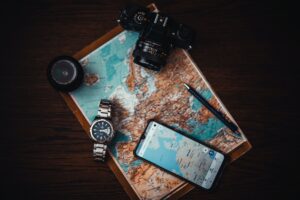Table of Contents
- The Logistics of Long-Distance Literature Sharing
- The Enchantment of Ephemeral Book Buddies
- The Debate Club: E-readers vs. Paperbacks in the Nomadic Life
- Reading as a Window and a Mirror
- Fostering Community Through Shared Stories
- Cultivating Literary Roads
The Logistics of Long-Distance Literature Sharing
In case you’re wondering, book clubs on wheels—or on foot, or via sailboat—are not without their logistical puzzles. Nonetheless, the nomadic tribe has found ingenious ways to keep the chapters turning and the discussions flowing. For starters, the omnipresent digital world offers the perfect platform for cross-continent book chats. Online forums and bookish social media platforms like Goodreads make finding, sharing, and discussing favorite reads as easy as finding free Wi-Fi at a café in Cusco or a blistering hot spot in the Sahara. Moreover, even in the most remote corners of the world, little free libraries have sprung up like mushrooms after rain—often in the most unexpectedly delightful places. Similarly, I’ve seen book swaps in hostels and cafes become treasure troves for travelers looking for their next literary fix. It was in one such book exchange, located inconspicuously in the corner of a rustic Icelandic lodge, that I stumbled upon ‘Love in the Time of Cholera,’ which, trust me, adds a fascinating layer to one’s musings when surrounded by geysers and glaciers.The Enchantment of Ephemeral Book Buddies
Certainly, some argue that the transient nature of nomadic life may not lend itself to the deep, lasting connections of traditional book clubs. However, there’s something uniquely enchanting about ephemeral book buddies—the kind you meet once in a blue moon under a Moroccan sky or in a balmy Thai night market, discuss one transformative book with, and never see again. These fleeting encounters weave stories within stories, adding layers of narrative that extend beyond the bound pages in your hands. It was at a quaint bus stop in Patagonia where I met Henrietta—a British octogenarian whose spirit for travel (and for Margaret Atwood’s ‘The Handmaid’s Tale’) matched the untamed landscapes around us. We conversed fervently for the span of two latitudes, and our amicable goodbye was as poignant as any story’s end. Though we might never cross paths again, our shared literature-fueled journey remains inscribed in my memory, as stunning as the backdrop against which it unfolded.Recommended article: How to Manage a Team from Another Continent

The Debate Club: E-readers vs. Paperbacks in the Nomadic Life
Consequently, while wandering the globe, the debate between e-readers and traditional books becomes more than a matter of preference; it’s a lifestyle choice. E-readers boast their featherlight weight and capacity for thousands of books—a nomad’s minimalist dream. Yet there are those, myself included, who argue that there’s an unmistakable charm to a physical book: the texture of the paper, the rhythmic flipping of pages, and the tangible evidence of the reader’s journey through bent corners and coffee-stain halos. But humor me for a bare moment as I recall trying to justify the weight of seven thick novels in my backpack to a customs official in New Zealand. His raised eyebrow seemed to silently mock my ‘old-school’ stubbornness as he sifted through titles ranging from Tolkien to Tolstoy. On that day, I must concede I envied my travel companion’s single, slim e-reader. Yet, the romantic idealist within me prevailed, and I hoisted my literary load onto my back with pride worthy of a modern-day Sisyphus.Reading as a Window and a Mirror
Reading, especially in the context of travel, serves simultaneously as a window and a mirror. It provides a lens through which we can observe unfamiliar cultures and worlds, while also holding up a reflective surface to our own experiences and identities. As nomads, the books we carry often transform, through the alchemy of travel, into companions that mirror our transient existence. On a particularly long journey across the Australian outback, ‘Tracks’ by Robyn Davidson became my companion, reflecting the vastness of the desert around me and the inner expanse of solitude that echoed with the hum of the engine. The memoir of a woman who traversed the harsh landscape with camels, Davidson’s writing merged with my reality, and I found myself in a palpable dialogue with the text that transcended the act of mere reading.Fostering Community Through Shared Stories
Above all, what literature and book clubs bring to the nomadic world is a sense of community. Stories are catalysts for connection, for finding common ground amidst the most diverse of backgrounds. Whether it’s via impromptu gatherings around a campfire or through synchronized reading lists followed by virtual discussions, lasting bonds are formed over shared narratives. During an impromptu get-together in a bustling Moroccan marketplace, as mint tea flowed as freely as the banter, a lively debate about Khaled Hosseini’s ‘The Kite Runner’ kept our group of erstwhile strangers engrossed until the stars took over the night sky. The shared passion for the book melded disparate lives, and email addresses were exchanged with as much eagerness as the spice vendors hawking their colorful wares.Recommended article: Most Affordable Cities For Digital Nomads



